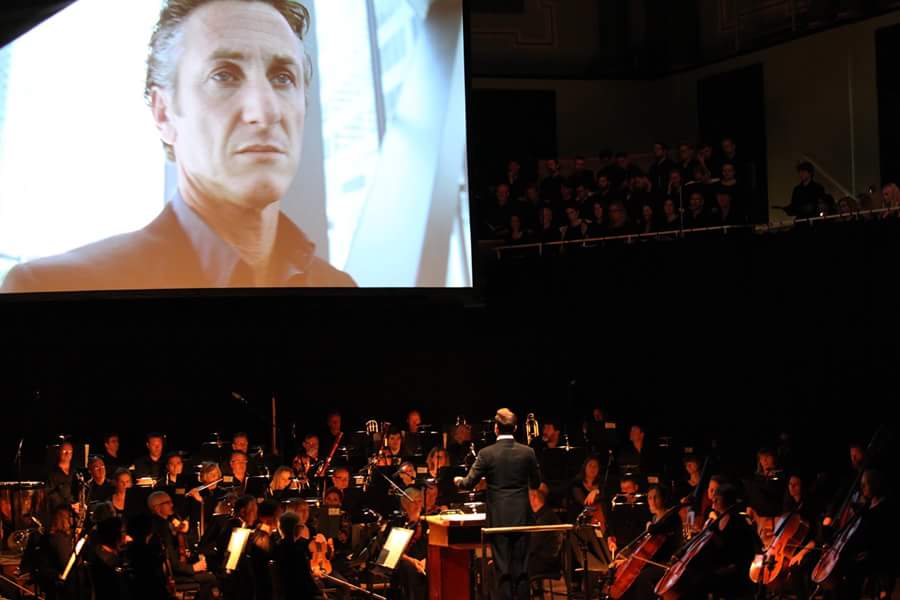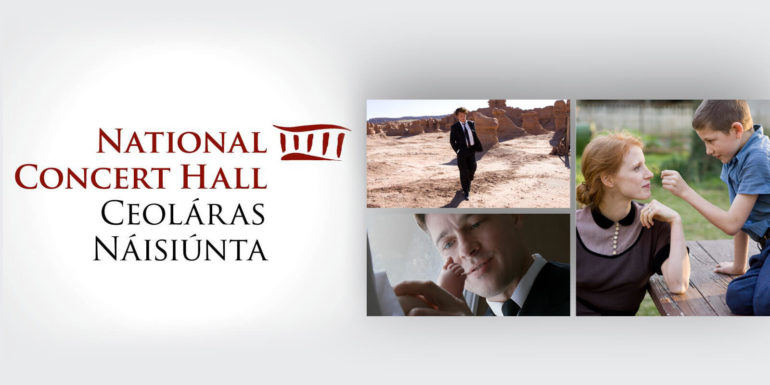Last Friday, Terrence Malick’s 2011 masterpiece and Palme D’Or winner at Cannes, The Tree of Life was screened at the National Concert Hall with a live soundtrack provided by the RTÉ National Symphony Orchestra and choir conducted by the young and very talented New Yorker Ryan McAdams. This special music-less print of the film was produced by Wordless Music and Fox Searchlight Pictures and its screening in the National Concert Hall was its world premiere, preceding performances in New York this November.
Anyone lucky enough to have been in the almost sold out auditorium will have surely considered themselves honoured to have experienced this wondrous event.
Nominated in 2012 for Best Picture, Director and Screenplay, Malick’s fourth feature film was mentioned by Robert Ebert as one of the ten greatest films of all time in Sight&Sounds 2012 Critics Poll. After making his first two films Badlands (1973) and Days of Heaven (1978) Malick moved to Paris and took a twenty year sabbatical, not surfacing again until 2005 with The New World. The Tree of Life seemed to renew his motivation and in recent years there’s been a boost to his productivity with To the Wonder in 2012, Knight of Cups this year and Weightless and The Voyage of Time coming up in 2017. Despite the long break in the 80s and 90s, Malick was in fact working on The Tree of Life intermittently all that time and that’s no surprise considering what an ambitious and epic piece of work he created.
The very loose and abstract narrative of The Tree of Life consists of the memories in flashback form of Jack O’Brien (Sean Penn), a successful engineer living in a 21st century city surrounded by gleaming sky scrapers, as he struggles to come to terms with a childhood growing up in Waco, Texas in the 1950s. The oldest of three children Jack (Jack as a child is played by an outstanding Hunter McCracken), is frequently torn between his parents conflicting approach to parenting. Mr O’Brien (Brad Pitt) is the strict and domineering man of the house, disillusioned with unfulfilled dreams. His wife, played by a radiant Jessica Chastain couldn’t be more different, nurturing her children with a quiet serenity. The loss of childhood innocence is poignantly depicted in the tragedies that Jack experiences as he grows up; the horrific drowning of a school friend, the burning down of a neighbour’s home resulting in the disfigurement of a young boy and Jack’s fathers violent outbursts. There are happy reminiscences too as the children enjoy the endless summers outside, their mother depicted through Malick’s stirring imagery and Emmanuel Lubowski’s striking photography as an angel, who dances on the front lawn in a billowing sun dress, pushing her boys on a swing or cooling down her long slender legs with water from the garden hose. Only Malick could turn a women hanging clothes on a washing line into a work of art!
Malick’s ambitions stretch far beyond the trials and tribulations of human life though. He takes it upon himself to portray the origin of the universe itself in a stunning sequence of the Big Bang and the inception of life on earth from the emergence of single celled organisms to the introduction of dinosaurs. For these amazing sequences Malick teams up with special effects pioneer Douglas Trumbell (2001: A Space Odyssey, Blade Runner).

The original score of The Tree of Life was composed by Alexandre Desplat, the French composer who won an Academy award for his score of The Grand Budapest Hotel. However, for this event at the National Concert Hall, the 100-piece orchestra performed the full film soundtrack of over thirty pieces of music from a diverse range of musical periods from the Baroque up to present day plus some of Desplat’s own compositions.
The RTE Choir were outstanding in their performance of Taverner’s Funeral Canticle, accentuating the heart-breaking opening scene when Jacks mother learns of the death of her other son. Some of the of the most seamless performances were the diegetic music included in the film; the organ solo of Bach’s Toccata and Fugue in D minor when Mr. O Brien plays for his family or the laid-back guitar and piano piece by Couperin blending subtly into the scene when young Jack and his Father play together. As Mr. O’Brien tries to educate his family about music over dinner, the orchestra belts out Brahms’ Symphony No.4 in E Minor.Review of Terrence Malick’s The Tree of Life, National Concert Hall, RT
It was impossible to decide which was more profound and moving; the choirs execution of the Lacrimosa 2 by Zbigniew Preisner (Polish film composer who worked with Krzysztof Kieslowsk) as a backdrop to Malick’s astounding Big Bang sequence or the exultant Vltava, the familiar theme track to The Tree of Life by nineteenth century Czech composer Bed?ich Smetana which was played out as the credits rolled. In any case, the RTÉ National Symphony Orchestra and choir were rewarded with a deserved standing ovation. The only improvement that could have been made to this event is lower lighting on stage and a much larger screen, so that the visuals in a film such as The Tree of Life could be appreciated to their utmost.
Upcoming film events in the National Concert Hall include May the Force be with you: A celebration of John Williams with the RTÉ Concert Orchestra on August 5th and a screening of a re-mastered edition of Singing in the Rain with live music from the orchestra on August 26th. The RTÉ National Symphony Orchestra will do a night of Movie Classics in July.

